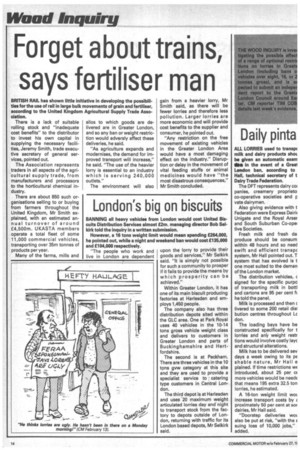Forget about trains, says fertiliser man
Page 10

If you've noticed an error in this article please click here to report it so we can fix it.
BRITISH RAIL has shown little initiative in developing the possibilities for the use of rail in large bulk movements of grain and fertiliser, according to the United Kingdom Agricultural Supply Trade Association.
There is a lack of suitable rolling stock and "inadequate cost benefits" to the distributor to invest his own capital in supplying the necessary facilities, Jeremy Smith, trade executive secretary of general services, pointed out.
The Association represents traders in all aspects of the agricultural supply trade, from manufacturers and processors to the horticultural chemical industry.
There are about 850 such organisations selling to or buying from farmers throughout the United Kingdom, Mr Smith explained, with an estimated annual turnover of around £4,500m. UKASTA members operate a total fleet of some 11,000 commercial vehicles, transporting over 35m tonnes of products per year.
Many of the farms, mills and silos to which goods are delivered are in Greater London, and so any ban or weight restriction would adversly affect these deliveries, he said.
"As agriculture expands and modernises, the demand for improved transport will increase," he said. "The use of the heavier lorry is essential to an industry which is serving 240,000 outlets."
The environment will also gain from a heavier lorry, Mr Smith said, as there will be fewer lorries and therefore less pollution. Larger lorries are more economic and will provide cost benefits to the supplier and consumer, he pointed out.
"Any restriction on the free movement of existing vehicles in the Greater London Area would have a most damaging effect on the industry." Disruption or delay in the movement of vital feeding stuffs or animal medicines would have "the most disastrous consequences," Mr Smith concluded.


















































